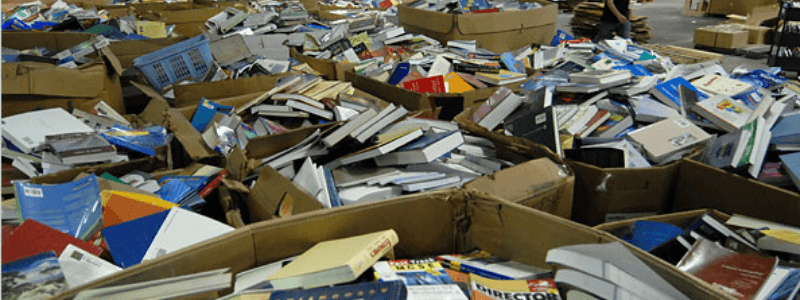Books are an important part of our daily lives. They provide us with knowledge, entertainment, and a way to escape reality. However, the production and disposal of books can have a significant impact on the environment. In this article, we will discuss the importance of disposing of books in an environmentally friendly way, the process of recycling and reusing books, and companies and charities that have initiatives to reduce book waste.
The Importance of Disposing of Books in an Environmentally Friendly Way
The production of books requires a significant amount of resources, including paper, ink, and energy. When books are not disposed of properly, they can end up in landfills where they release methane, a greenhouse gas that contributes to climate change. Additionally, paper production is a major contributor to deforestation and habitat destruction. By disposing of books in an environmentally friendly way, we can reduce the negative impact of book production on the environment.

Recycling and Reusing Books
One of the best ways to dispose of books in an environmentally friendly way is to recycle or reuse them. Many organizations and companies offer book recycling services. The process of recycling books involves breaking down the paper fibers and turning them into new paper products. Some companies also use recycled paper to produce new books.
Reusing books is another great way to reduce waste. Donating books to libraries, schools, and charities is a great way to give them a new life. Additionally, many bookstores and libraries have book exchange programs where customers can trade in their old books for new ones.
Companies and Charities that Help Reduce Book Waste
There are many companies and charities that have initiatives to help reduce book waste. For example, the World Wildlife Fund (WWF) has a program called "Booksmart" that encourages people to recycle their old books. The program also aims to raise awareness about the environmental impact of book production.
Another example is the Books for Africa organization which is dedicated to collecting, shipping, and distributing books to children in Africa. This organization helps to reduce book waste by providing books to communities that otherwise would not have access to them.
Frequently Asked Questions
Q: Can books be recycled? A: Yes, books can be recycled by breaking down the paper fibers and turning them into new paper products.
Q: What should I do with books I no longer want? A: You can recycle, donate, or exchange your old books.
Q: Can books be reused? A: Yes, books can be reused by donating them to libraries, schools, or charities.
Conclusion
In conclusion, disposing of books in an environmentally friendly way is important for reducing the negative impact of book production on the environment. By recycling, reusing, and supporting organizations that have initiatives to reduce book waste, we can all do our part to protect the planet.










